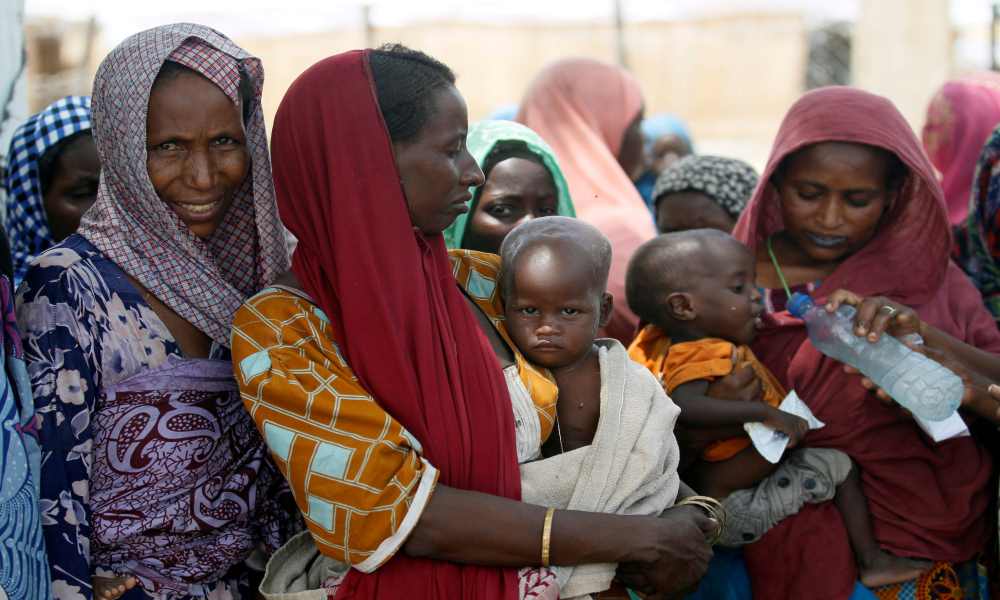Food shortages are next global health crisis
Boost investment in agriculture
Rising food and energy prices, in part sparked by the war in Ukraine, could kill millions both directly and indirectly.
JENNIFER RIGBY
Growing food shortages may represent the same health threat to the world as the Covid-19 pandemic, a leading global health figure has warned.
Rising food and energy prices, in part sparked by the war in Ukraine, could kill millions both directly and indirectly, Peter Sands, the executive director of the Global Fund to Fight AIDS, Tuberculosis and Malaria, told Reuters in an interview.
“Food shortages work in two ways. One is you have the tragedy of people actually starving to death. But second is you have the fact that often much larger numbers of people are poorly nourished, and that makes them more vulnerable to existing diseases,” he said.
He said efforts to improve pandemic preparedness should not make the “classic” mistake of concerning themselves only with crises that resemble the most recent threat the world has faced.
“It’s not as well-defined as some brand-new pathogen appearing with distinctive new symptoms. But it could well be just as deadly,” he said.
According to the Agricultural Bank of Namibia (Agribank), the outlook for global acute food insecurity in 2022 is expected to deteriorate further relative to 2021.
The prevailing drought, high energy prices and the Covid-19 pandemic, worsened the availability and accessibility of food in Namibia.
In December 2021, nearly a million people across Namibia experienced food insecurity, Agribank cited the Integrated Food Security Phase Classification (IPC).
The agricultural sector experienced significant contractions from the second quarter of 2019. The contraction emanated from high levels of livestock losses due to drought and low stock herd levels.
The sector is slowly recovering as a result of normal to average rainfall received in 2021 and 2022 rain seasons, which has relatively improved rangeland condition and food production in the country, Agribank added.
Although the improvement is not broad-based, it provides farmers an opportunity to re-set their farming practices and redirect investments towards climate smart production practices, Agribank said.
-Additional reporting by Phillepus Uusiku
Growing food shortages may represent the same health threat to the world as the Covid-19 pandemic, a leading global health figure has warned.
Rising food and energy prices, in part sparked by the war in Ukraine, could kill millions both directly and indirectly, Peter Sands, the executive director of the Global Fund to Fight AIDS, Tuberculosis and Malaria, told Reuters in an interview.
“Food shortages work in two ways. One is you have the tragedy of people actually starving to death. But second is you have the fact that often much larger numbers of people are poorly nourished, and that makes them more vulnerable to existing diseases,” he said.
He said efforts to improve pandemic preparedness should not make the “classic” mistake of concerning themselves only with crises that resemble the most recent threat the world has faced.
“It’s not as well-defined as some brand-new pathogen appearing with distinctive new symptoms. But it could well be just as deadly,” he said.
According to the Agricultural Bank of Namibia (Agribank), the outlook for global acute food insecurity in 2022 is expected to deteriorate further relative to 2021.
The prevailing drought, high energy prices and the Covid-19 pandemic, worsened the availability and accessibility of food in Namibia.
In December 2021, nearly a million people across Namibia experienced food insecurity, Agribank cited the Integrated Food Security Phase Classification (IPC).
The agricultural sector experienced significant contractions from the second quarter of 2019. The contraction emanated from high levels of livestock losses due to drought and low stock herd levels.
The sector is slowly recovering as a result of normal to average rainfall received in 2021 and 2022 rain seasons, which has relatively improved rangeland condition and food production in the country, Agribank added.
Although the improvement is not broad-based, it provides farmers an opportunity to re-set their farming practices and redirect investments towards climate smart production practices, Agribank said.
-Additional reporting by Phillepus Uusiku





Kommentar
Allgemeine Zeitung
Zu diesem Artikel wurden keine Kommentare hinterlassen